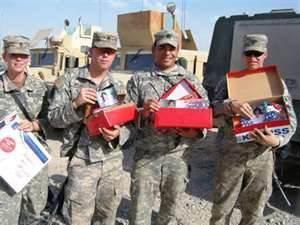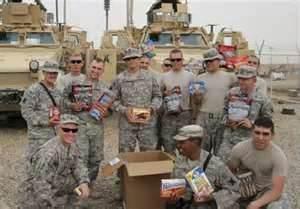On Afghan Odyssey, Gifts to Troops Brave Ambushes, Bombs
Wall Street Journal: Back home in Watertown, Minn., Courtney Mittelstaedt selected her husband’s Christmas gifts with the care and sweet mischief of a newlywed.
She bought Legos, a plastic duck in a Santa Claus suit and Christmas tree-shaped marshmallows, “his favorite candy,” said Mrs. Mittelstaedt, a 20-year-old hairdresser. She used Spider-Man wrapping paper to remind him of the last time they went to the movies, before her husband, Army Private First Class Cody Mittelstaedt, went to war 7,000 miles away.
“He’s gone and Christmas is so hard without him,” said Mrs. Mittelstaedt, who married last year. “Buying gifts and wrapping them up for him makes me feel like he’s involved and he’s here with me.”
Her husband’s presents will join 6.4 million pounds of mail the U.S. Postal Service estimates it will ferry this month from families, friends and kindly strangers to U.S. troops in Afghanistan.
After Mrs. Mittelstaedt wrapped, sealed and addressed the gifts to Forward Operating Base Gardez, she took them to her post office, where the workers know her by name. She has become a regular customer, sending packages of letters, toys and candy at least once a week since her husband was deployed overseas three months ago.
“Everything is so serious there, it’s war,” she said. “So when he gets the packages I want him to smile and not think about his day. I don’t know if it takes off the weight, and I’m sure it doesn’t work like that, but I can pretend, I guess.”
Postal Service offices across the U.S. funnel packages to Afghanistan through its International Service Center in Newark, N.J. Then they travel by air—usually via Manama, Bahrain—to Bagram Airfield outside of Kabul, according to a Postal Service spokeswoman.
From Kabul, the delivery of Christmas letters, trinkets and toys to troops in combat bases is the job of private contractors, including Innovative Logistics. The Florida-based military contractor moves U.S. mail by truck across some of Afghanistan’s most dangerous terrain, braving Taliban ambushes and improvised explosive devices, or IEDs, planted on roadsides.
The men who carry the mail in heavily armed convoys—Americans, Bosnians, Afghans, Fijians—call themselves the Pony Express, in homage to the short-lived mail service that connected California with Missouri before the Civil War.
“The U.S. post service has rain, sleet or snow. We have all of that plus IEDs,” said Jeff Bedford, 38, as he rode in a mail convoy during a three-hour drive this month from Kabul to Gardez, capital of the insurgent-filled Paktia province.
Mr. Bedford’s convoy brought spare fuel canisters, and each crew member carried a medical kit. They also brought Pop-Tarts, beef jerky, water and Gatorade for the ride. The mail, including Pfc. Mittelstaedt’s gifts, traveled in 20-foot cargo trucks, accompanied by an escort of gun trucks—fortified and bulletproofed bank trucks with roof-mounted machine-gun turrets.
Innovative Logistics took over its mail delivery contract from another contractor in May and retained some previous staff, including Mr. Bedford, a former Marine who has been injured twice on the job. The combat mailmen are well compensated because the work is so dangerous. For one, they can’t count on immediate rescue or medevac help that U.S. troops take for granted. Contract employees doing work for the military in Afghanistan generally earn more than $100,000 a year.
At the height of the summer fighting season, two out of the three mail convoys would be “hitting the panic button” to notify the company headquarters of an insurgent attack, said Dan Wildtraut, 55, a former Sarasota, Fla., police officer who serves as Innovative Logistics’ country manager.
Last year, Mr. Bedford’s convoy was struck by a 500-pound IED after delivering mail to the dangerous province of Ghazni in the southeast. The explosion knocked him unconscious and killed three Afghans and a Bosnian contractor. A Fijian driver died after he was thrown out of his vehicle and pinned beneath a gun truck.
When Mr. Bedford awoke, his team was under heavy fire from insurgents. He grabbed his gun and fought back, he said, his adrenaline masking the pain from two ruptured spinal disks. He and his men called for help but waited nearly five hours for a coalition quick-reaction force to arrive from Ghazni, about 13 miles away.
Lt. Col. Miroslaw Ochyra, spokesman for the Polish military that is responsible for Ghazni province, said the quick reaction force arrived at the ambush site “later than usual” because it was deployed five times that day, including a mission to assist Polish soldiers who had come under fire.
When the soldiers finally found the mail convoy, they asked Mr. Bedford if they could call in an Apache helicopter strike to destroy the two disabled gun trucks with a Hellfire missile. The convoys often carry registered mail, including classified documents, which can’t fall into enemy hands.
“I said, ‘Rock on, whatever works,’” Mr. Bedford recalled. “Typically, we burn them, but they wanted to use a missile. Fine with me. Whatever got me out of there fastest.” On this latest trip, Mr. Bedford’s convoy passed the site of two fresh IED explosions. One had blown a crater large enough to swallow the front half of a cargo truck.
The convoy then began a long climb to an elevation of 10,000 feet on rough, icy roads, at one point wedged between the mountainside and a sheer cliff.
About a dozen workers have died and many more wounded in the past three years delivering the mail here. The most recent employee killed, an Afghan gunner, died in a Taliban ambush near the eastern city of Jalalabad in September. The company uses about 100 employees for a delivery service that the U.S. military might require a battalion task force of 1,200 troops, given the required ground and air support.
When the convoy reached F.O.B. Gardez, two cargo trucks unloaded roughly 10 tons of mail. Pfc. Mittelstaedt was assigned to retrieve his unit’s portion, which he loaded onto a pickup truck.
He parked in front of a badly cracked concrete basketball court, which is flanked on one side by the “Wall of Heroes” bearing the names of 32 troops killed in action. A carved wooden sign proclaiming, “No girls allowed” hung above the entrance to the unit’s living quarters.
The troops from Task Force Rakkasan 1-187 swarmed the court to collect their mail under a cold winter sun. Pfc. Mittelstaedt, who is a sniper, stood in the truck’s pickup bed and threw packages to his colleagues for them to divvy into piles on the court. “I’ll just tell you this once,” he joked, “this pile here, this pile is the snipers’ pile.”
The letters and packages came mostly from families and friends. But there also was mail from individuals and groups that send care packages to random soldiers. These gifts usually include candy, hygienic supplies and, for some lucky troops, home-baked pies.
Pfc. Patrick Pease, a 21-year-old soldier from Indiana, got his lucky turn that day. After three months in Afghanistan, he received two packages from the Blue Star Mothers of America, a volunteer group: Reese’s Peanut Butter Cups and M&M’s stuffed into Christmas stockings.

After dispatching his mail duties, Pfc. Mittelstaedt grabbed his Army-issued knife and slashed open his package. The 23-year-old smiled. He placed the Santa-clad plastic duck on a shelf alongside Star Wars-theme Santa toys, previous gifts from his family. His rifle hung on nails in a plywood wall.
He also received a letter from a U.S. family he didn’t know, Mr. and Mrs. Wendle of Spring Branch, Texas. “Wishing you the most memorable Christmas yet, and wishing you home soon,” Pfc. Mittelstaedt read out loud. “From Donna.” He tossed the card on his Christmas shelf. “I don’t know ‘em,” he said. Tuesdays and Thursdays—mail days—are “the best days ever,” he said.
Soon, the Pony Express riders were getting ready to head back down the treacherous road to Kabul, piling into their trucks as driver Miroslav Gogic, a 44-year-old former Serbian soldier blasted the music of pop singer Celine Dion, to the annoyance of his colleagues.
Medic Justin Perkins sat next to him in the passenger seat, shouting over the music and engine noise. “There’s a lot of animosity between contractors like us and the Army,” said Mr. Perkins, 30, from Alaska. “They look down at us because we do the same job they do but get paid a hell of a lot more.”
On delivery days, there is no animosity, he said: “Everyone loves the mailman.“
If you’d like to send a care package to our troops, go to Soldiers’ Angels or anysoldier.com.
DCG


